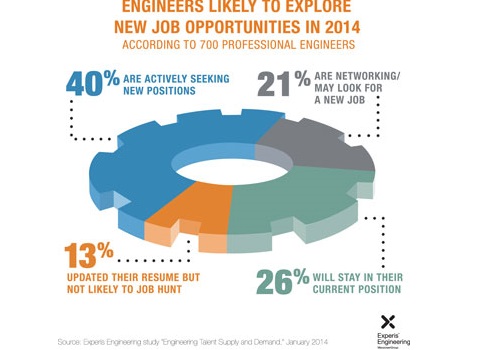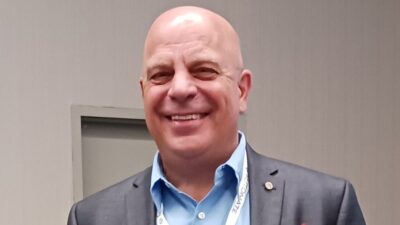Career Update: Demographic shifts and talent shortages put engineers in the driver’s seat. This advice will help maximize your personal potential as an engineering resource.

Engineers are in greater demand than ever; working with a recruiter is one way to advance an engineer’s career path. By 2020 older workers will account for more than a quarter of the U.S. workforce, and the engineering industry has an older demographic than most. As older engineers start planning their retirement, employers are challenged with filling talent pipelines of skilled and experienced engineers. What’s more, 61% of engineers may look for new engineering jobs in 2014, according to the Experis Engineering Talent Supply and Demand survey.
There’s no doubt that engineers are in demand, and we’re seeing a real "engineer’s market," where engineers are in the driver’s seat when it comes to employment opportunities. In fact, engineers have placed among the top 10 most difficult jobs to fill in the U.S. since 2008, according to the ManpowerGroup Talent Shortage Survey. This combination of demographic shifts and employer demand is creating a perfect storm for engineering talent.
How to work with recruiters
Increasingly, employers are turning to experienced recruiters to help them source new talent. It’s not uncommon for engineers to receive multiple calls and requests from recruiters looking to lure them away from their current positions. Being courted by recruiters may be flattering, but it can also be overwhelming, especially as many can appear to be more interested in their benefit than yours. Learning how to work with a recruiter is an essential skill that can have big payoffs for both your career development and wallet. Heed this advice.
1. The biggest priority is to ensure your relationship with a recruiter is a mutually beneficial one.
This can be assessed right from the first interaction with a recruiter. If the recruiter’s opening line is "I have a job," he or she hasn’t taken that vital first step to get to know you and your career goals. It’s a good sign if the recruiter contacts you with a genuine interest in your experience and employment goals. It takes time to develop a relationship based on trust and likability, but it’s important to set guidelines for how your recruiter’s job recommendations align with your ambition. After you’ve established a foundational relationship with a recruiter, there are additional ways you can make sure that relationship continues to add value.
2. Be confident in your experience.
Your experience and expertise may not be a fit for what the recruiter is looking for today, but you may have flexible skills that can be applied to a new role. Recruiters know the flexible skills that can help you transition to new roles and industries.
3. Know the value you provide.
Take time to think about the value you provide a potential employer. Your value may be your skill set and experience, but it is also the way you work with others in a collaborative way.
4. Rework your resume; this is your first impression.
Focus on your accomplishments and what differentiates you from others with similar skills. Use action words to describe what you have implemented, created, saved, etc.
5. Be prepared to talk about pay history.
A recruiter will need to know your salary or fee range so he or she can connect you with opportunities that make sense.
Today’s talent shortage in the engineering sector provides an opportunity to advance your career. Working with the right recruiter will give you confidence in your experience and abilities.
– Deb DeCamp is vice president of recruiting at Experis. Edited by Mark T. Hoske, content manager, CFE Media, Control Engineering, [email protected].
ONLINE
Find more information, resources, and links at the bottom of this post. www.experis.us/Clients.htm
Key concepts
- Demographics put engineering talent in demand.
- Survey shows that many engineers are willing to look at new opportunities.
- Engineers should plan and prepare in the job hunt, even when working with a recruiter.
Consider this
The process of matching an engineer’s talents, abilities, and goals to a position has many similarities to an engineering project.
ONLINE extra
Deb DeCamp, vice president-recruiting, Experis North America, is focused on attracting, engaging, and retaining top talent to support the workforce needs of Experis’ clients. She joined ManpowerGroup in 2003 and previously served as a senior regional vice president responsible for accelerating technology talent and solutions in the niche verticals of IT, finance, and engineering.
With more than 20 years in the staffing industry, DeCamp is responsible for the strategy and overall operational framework for all North American recruitment activities for Experis, with a focus on creating a sustainable, high-performing, world-class recruiting organization. She leads the Experis Center of Recruiting Excellence and oversees a recruiting team of more than 350.
In 2007, DeCamp was selected to represent North America on a mission-critical global strategic project for ManpowerGroup that took her to Stockholm and London, where she worked with company leaders of more than 15 countries. Together, they compiled country best practices and thought leadership for international business initiatives.
She earned a bachelor’s degree in communications from Florida State University and has completed executive programs at the Booth School of Business-University of Chicago, INSEAD International, Fontanblue France, and the Strategic Leadership series through the University of Wisconsin-Milwaukee Executive MBA program.



